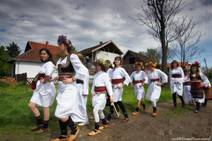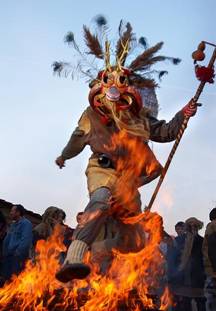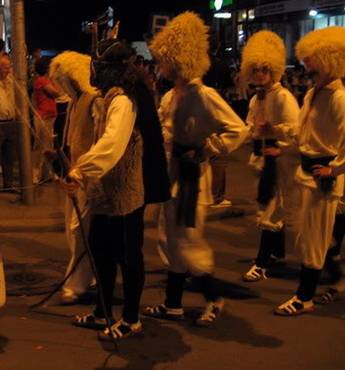
Once there was a custom in all parts of Serbia that groups from six to eight girls, called "Lazarice", went from house to house on Vrbica ("Lazar's Saturday"). In front of each house they used to sing special songs accompanied by ceremonial dance called "streljanje" ("shooting"). After that the national celebration would begin. This custom is still present in South Serbia, in the region of Leskovac.
| Ansambl Kolo - Pcinjske Lazarice |

The months of January and February are the time of carnival throughout the country. Dancers appear wearing fantastic masks, sometimes more than six feet tall, decorated at the top with bird wings and feathers, heads of animals, as well as mirrors and colored streamers. Covered with sheep skins and armed with long clubs and wooden swords, they leap and jump to the deafening sound of drums and the cattle bells on their belts. In some areas the men blacken their faces and wear womens overdresses to perform these carnival dances that drive out evil winter demons and ensure health and good crops.
In some ways the carnival custom of Serbia(Republika Srpska) is the most spectacular and colorful of all the ritual dance events. Performed mainly during the week before Lent, the festival in its entirety may last for a good part of February, beginning sometimes as early as January.
| Poklade - TV Devic |
"DODOLE" songs are typical ritual songs used to perform during summer dry seasons. Young girls masked themselves with branches and leaves (as symbol of vegetation exuberance).They used to visit village houses and perform "dodole" ritual (singing "dodole" songs and dancing ritual dance).As respond to a ritual performance, the master of the house would come out from house and throw some water on dancers, which is ancient way of invoking the spirits of rain. "Dodole" ritual originates from pre-Christian times and represents the oldest Slavic tradition.
| Dodole - KUD Vakup | Dodole - from TV serial 'Vuk Karadzic' |
 The koleda is a custom that a group of young men, masked and costumed, goes from house to house of their village singing special koleda songs and performing acts of magic to summon health, wealth, and prosperity for each household. The members of the group are called koledari. The koleda is carried out from the Feast of Saint Ignatius Theophorus (five days before Christmas) up until the Epiphany. This custom is best preserved in the upper Pčinja District, and in the region around the River South Morava in the Jablanica District, south-eastern Serbia. Regarded as pagan and discouraged by the Serbian Orthodox Church, the koleda ceased to be performed among most of the Serbs during the 19th and 20th centuries.
The koleda is a custom that a group of young men, masked and costumed, goes from house to house of their village singing special koleda songs and performing acts of magic to summon health, wealth, and prosperity for each household. The members of the group are called koledari. The koleda is carried out from the Feast of Saint Ignatius Theophorus (five days before Christmas) up until the Epiphany. This custom is best preserved in the upper Pčinja District, and in the region around the River South Morava in the Jablanica District, south-eastern Serbia. Regarded as pagan and discouraged by the Serbian Orthodox Church, the koleda ceased to be performed among most of the Serbs during the 19th and 20th centuries.
Koledari prepare themselves during several days before the start of the koleda: they practice the koleda songs, and make their masks and costumes. The masks can be classified into three types according to the characters they represent: the anthropomorphic, the zoomorphic (representing bear, cow, stag, goat, sheep, ox, wolf, stork, etc.), and the anthropo-zoomorphic. The main material from which they are produced is hide. The face, however, may be made separately out of a dried gourd shell or a piece of wood, and then sewn to hide so that the mask can cover all the head. The moustache, beard, and eyebrows are made with black wool, horsehair, or hemp fibers, and the teeth with beans. Zoomorphic and anthropo-zoomorphic masks may have white, black, or red painted horns attached to them. The costumes are prepared from ragged clothes, sheepskins with the wool turned outside, and calf hides. Strings of little bells and ratchets are fastened around the waist and the knees of the costumes. An ox tail with a bell fixed at its end may be attached at the back of them.
The leader of the group is called Grandpa. The other koledari gather at his house on the eve of koleda, and at midnight they all go out and start their activities. Walking through streets of the village they shout and make noise with bells and ratchets. Most are armed with sabers or clubs. One of them, called Bride, is masked and costumed as a pregnant woman. He holds a distaff in his hand and spins hemp fibers. The koledari tease and joke with Bride, which gives a comic note to the koleda. Several of them are called alosnici (s. alosnik), representing men possessed by the demon ala. There may be other named characters in the group.
The koledari sing special songs, in which the word koledo, the vocative case of koleda, is inserted in the middle and at the end of each verse. Grandpa initiates each song, determining which one will be sung at a given time. His choice depends on whether they are in a street, or coming in front of, entering, staying in, or leaving a house: there is a separate set of the songs for each of these situations. Vuk Stefanović Karadžić recorded in the 19th century the lyrics of a number of the koleda songs, including the following one, which koledari sung while entering a house:
| Добар вече, коледо, домаћине, коледо! Затекосмо где вечера, на трпези вино пије, твој говедар код говеда. Краве ти се истелиле, све волове витороге; кобиле се иждребиле, све коњице путоноге; овце ти се изјагњиле, све овчице свилоруне. Чобанин се наслонио на гранчицу ораову. Туд пролази млада мома, да поткине ту гранчицу. Проговара чобанине: „Девојчице, бело лице, ко ти реза борну сукњу, у скутови разбориту, у појасу сабориту?“ „Имам брата баш-терзију, те ми реза борну сукњу, у скутови разбориту, у појасу сабориту.“ |
Good evening, koledo, head of household, koledo! |
In the following song, also recorded by Vuk Stefanović Karadžić, the badnjak and Christmas are referred to as male personages. An opposition is made between the former, described as old, and the latter, described as young. Koledari sung it to the household head in whose home they came:
| Домаћине, коледо, господине, коледо! Застасмо те за вечером, где вечеру ти вечераш, белим грлом вино пијеш, и очима бисер бројиш, и рукама гајтан плетеш. Додај нама крај гајтана, на чем ћемо Бога молит за старога - за Бадњака, за младога - за Божића. |
Head of household, koledo, honored master, koledo! |
Besides the singing, the koledari also chase away demons from the household. First they search the house to find out where the demons hide. They look everywhere, at the same time shouting, dancing, jumping, knocking on the floor and walls with sticks, and teasing Bride. When they find the demons, they drive them out of the hiding place, and fight with them swinging their sabers and clubs. After the demons are chased away, the koledari briefly dance the kolo, and then bless the household. As a reward, they receive a loaf of bread which the family prepared specially for them, and other food gifts.